Comparing Two 1TB NVMe Drives with Same NAND, Same Controller: XPG SX8200 Pro vs HP EX950
by Billy Tallis on February 6, 2019 11:30 AM ESTAnandTech Storage Bench - The Destroyer
The Destroyer is an extremely long test replicating the access patterns of very IO-intensive desktop usage. A detailed breakdown can be found in this article. Like real-world usage, the drives do get the occasional break that allows for some background garbage collection and flushing caches, but those idle times are limited to 25ms so that it doesn't take all week to run the test. These AnandTech Storage Bench (ATSB) tests do not involve running the actual applications that generated the workloads, so the scores are relatively insensitive to changes in CPU performance and RAM from our new testbed, but the jump to a newer version of Windows and the newer storage drivers can have an impact.
We quantify performance on this test by reporting the drive's average data throughput, the average latency of the I/O operations, and the total energy used by the drive over the course of the test.
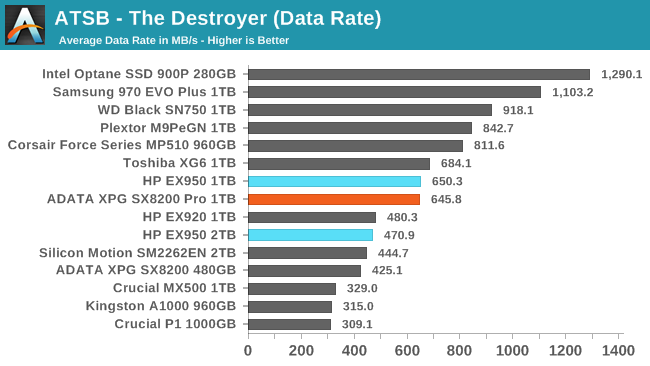
The 1TB models of the ADATA SX8200 Pro and HP EX950 go a long way toward catching up with other current high-end drives, but ultimately their overall performance on The Destroyer is inadequate. The 2TB EX950 doesn't even outperform last year's 1TB EX920.
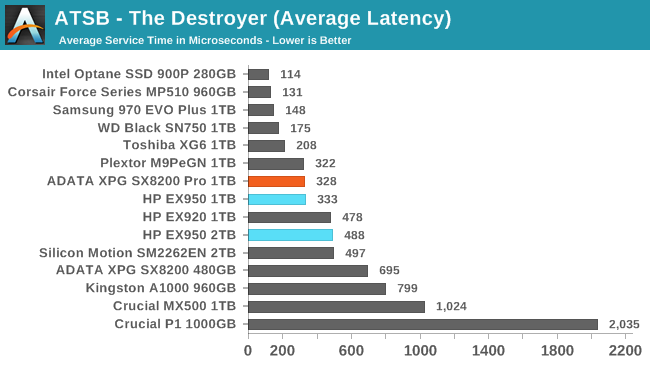
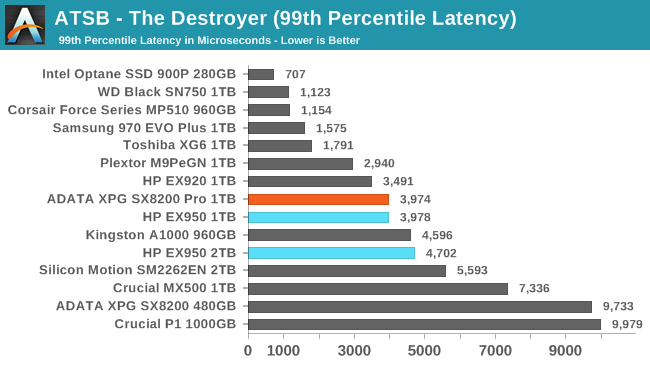
The average latency of the 1TB SM2262EN drives on The Destroyer is a significant improvement over their predecessors, but as with the average data rate it doesn't bring them up to the level of other recent high-end drives. The 99th percentile latency has actually regressed slightly from what the 1TB HP EX920 provided. The 2TB EX950 is slower in both metrics than the 1TB drives, but the 99th percentile latency score has improved from the pre-production firmware we tested last year.
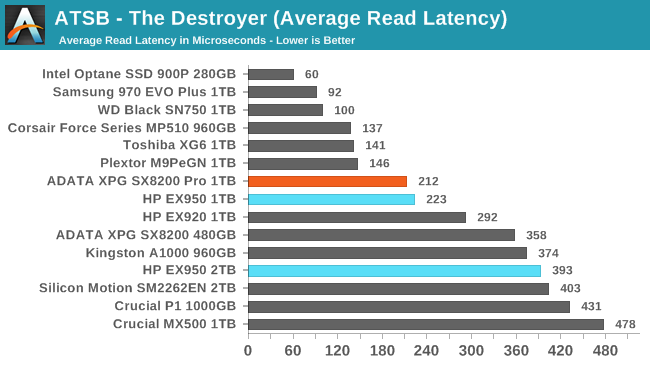
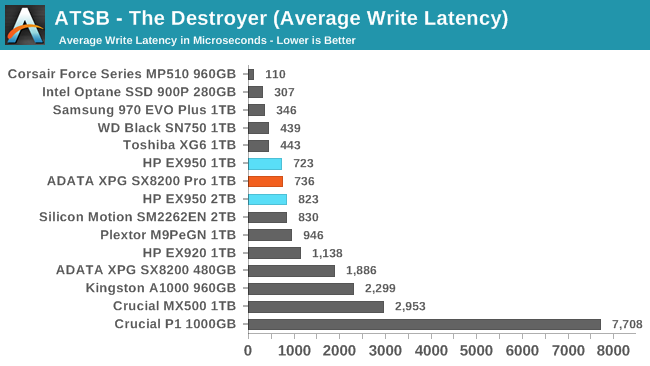
The 2TB HP EX950 has significantly worse average read latency than the 1TB models of the EX950 or EX920, but the average write latency is comparable to the 1TB EX950 and a clear improvement over the EX920. Regardless of capacity, the SM2262EN drives still have a lot of room for improving latency on The Destroyer.
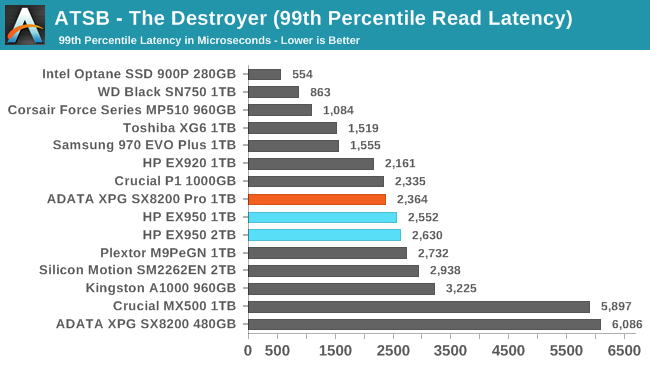
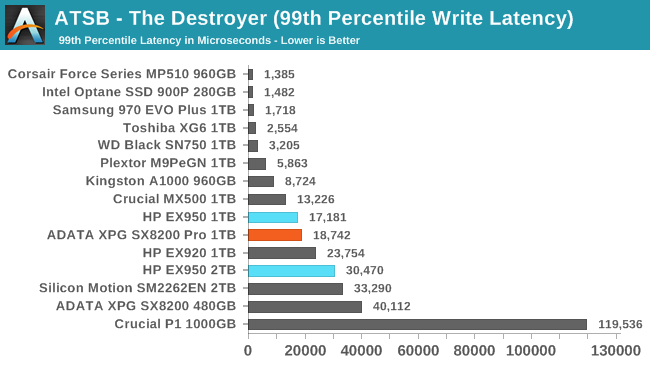
Overall, the 99th percentile read latency scores from the SM2262EN drives are closer to being competitive with other recent high-end drives than the 99th percentile write latencies, but both need to improve—especially the read QoS that has regressed slightly from the HP EX920. The SM2262 and SM2262EN drives have worse 99th percentile write latency on The Destroyer than the Crucial MX500, a SATA drive that is itself powered by a Silicon Motion controller.
For average latency, the 2TB EX950's weakness was on read operations, but when looking at 99th percentiles, it's writes that are a problem for the 2TB drive, though not as much as with the pre-production firmware.
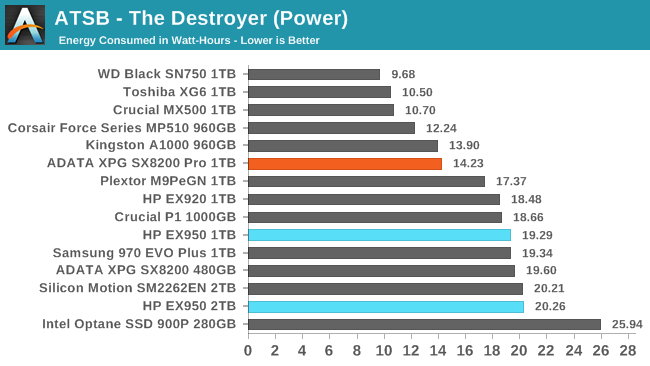
The ADATA SX8200 Pro used significantly less power during The Destroyer than the HP EX950, putting the SX8200 Pro well ahead of the entire collection of SMI-based NVMe drives and close to the Phison E12-based Corsair MP510. WD and Toshiba remain the only ones to actually tie or surpass the power efficiency of SATA drives on this test. The 2TB EX950 unsurprisingly consumes a bit more energy than the 1TB model, thanks to having more memory to keep powered and due to firmware optimizations that are more ill-suited to this test than how the 1TB models behave.










42 Comments
View All Comments
mapesdhs - Thursday, February 7, 2019 - link
I can't help wondering how some of the old favourites would behave in these comparisons, the 950 EVO/Pro, 960s, etc. Have things really moved on that much?Billy Tallis - Thursday, February 7, 2019 - link
We have at least partial test results in Bench for most of the old drives that aren't worth including in every review: https://www.anandtech.com/bench/product/2219?vs=23...eddieobscurant - Thursday, February 7, 2019 - link
It's not about crystal disk mark score. It's about almost no one of the everyday user, playing games, surfing the web and using microsoft office, will come near your "light" test, let alone "heavy" or "torture".Most of them need high random reads for their computer to feel snappy and responsive, and a big enough a slc cache to accommodate a full bluray of writes.
Billy Tallis - Thursday, February 7, 2019 - link
"Most of them need high random reads for their computer to feel snappy and responsive,"They already have that. Further increases to random read performance won't make the system feel any more responsive during light workloads, as demonstrated by SYSmark. High-end NVMe SSDs are already way past the point of diminishing returns for peak random read speeds, especially for lighter workloads where a few GB of DRAM used by the OS for caching is enough to almost completely decouple storage performance from application responsiveness.
eddieobscurant - Friday, February 8, 2019 - link
So, you're saying that optane doesn't feel more responsive to you, or that the high random reads of optane isn't responsible for feeling more responsive than a high end nvme ssd ?Dark_wizzie - Wednesday, February 6, 2019 - link
Why does perf drop on 2tb model?Dark_wizzie - Thursday, February 7, 2019 - link
For low qd random reads, sorry.Dark_wizzie - Thursday, February 7, 2019 - link
And... serves me right for commenting before finishing the last page of the article. >.>oh well.
GreenReaper - Thursday, February 7, 2019 - link
Grabbed an MX500 500GB at Christmas. It's half the price of those tested here, and uses up a spare SATA. Hardly the fastest SSD in the world, but for most purposes it's hard to tell the difference.mapesdhs - Thursday, February 7, 2019 - link
They do seem to be well priced, though I bagged several barely used 850 Pro 512GB units for about the same cost, people seem to be selling them for silly money these days, grud knows why. The 840 Pro is also still very good, one of the most reliable SATA SSDs ever made.